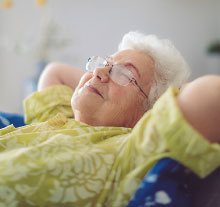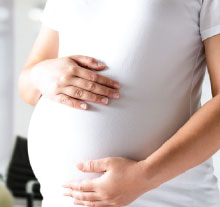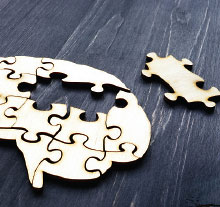Journal Digest: Seniors and Loneliness; Caripazine and Brain Development; Family and Bipolar Disorder; Alzheimer's and COVID-19
IPSRT Found to Improve Functioning in Patients With Bipolar Disorder

Older adults who experience loneliness due to physical isolation during the COVID-19 pandemic are at higher risk of developing psychiatric disorders, but only if they feel old, suggests a study in the American Journal of Geriatric Psychiatry.
The findings were based on a survey of 277 adults aged 60 and older in Israel who were asked to rate their general health, subjective age (whether they felt younger or older than their age), exposure to COVID-19, loneliness, depression, anxiety, and distress.
After adjusting for age, demographics, and COVID-19–related variables, the researchers found that adults who reported feeling lonely and older also reported higher depression, anxiety, and distress symptoms.
“[T]he current preliminary findings may inform screening and interventions with older adults both during the COVID-19 pandemic and probably in assisting with post-COVID-19 damage control,” the investigators wrote. Screening for subjective age might identify older adults at high risk of the detrimental effects of isolation, they noted. They also suggested that online or telephone interventions targeting loneliness could incorporate tools to improve age identity to help bolster the therapeutic effect.
Shrira A, Hoffman Y, Bodner E, Palgi Y. COVID-19 Related Loneliness and Psychiatric Symptoms Among Older Adults: The Buffering Role of Subjective Age. Am J Geriatr Psychiatry. May 27, 2020. [Online ahead of print]
Cariprazine Found To Interfere With Fetal Brain Development

A study published in Molecular Psychiatry suggests that exposure to the antipsychotic cariprazine in utero might compromise brain development in rare cases.
Cariprazine exerts its antipsychotic effects via interactions with dopamine and serotonin receptors, but research has shown it can also inhibit the enzyme 7-dehydrocholestrol reductase (DHCR7), a key component of the pathway that makes cholesterol. And since cholesterol cannot pass the blood-brain barrier, dietary cholesterol cannot overcome DHCR7 deficiencies in the brain.
For the study, researchers at the University of Nebraska Medical Center and Vanderbilt University assessed the effects of cariprazine exposure on the offspring of female mice with two copies of the Dhcr7 gene and female mice missing one copy of the Dhcr7 gene.
They found that mice born to mothers exposed to cariprazine had higher levels of cholesterol precursor molecules in multiple tissues, particularly brain tissue, relative to mice whose mothers had no exposure; these molecules were elevated to potentially toxic levels in mice born to females with one copy of the Dhcr7 gene.
The investigators, who had previously discovered aripiprazole interferes with cholesterol production, noted that 1% to 3% of people have variants in their Dhcr7 genes that reduce enzyme activity. The authors advised that women with Dhcr7 mutations who are nursing, pregnant, or plan to become pregnant should not be prescribed cariprazine or aripiprazole.
Genaro-Mattos TC, Anderson A, Allen LB, et al. Maternal Cariprazine Exposure Inhibits Embryonic and Postnatal Brain Cholesterol Biosynthesis. Mol Psychiatry. June 5, 2020. [Online ahead of print]
Family History May Predict Symptoms in Patients With Bipolar Disorder

Patients with bipolar disorder who also have a family member with a psychiatric disorder appear to have more severe symptoms than bipolar patients without a family history of psychiatric disorders, according to a study in the Journal of Affective Disorders. Though these patients may require more intensive therapy, they are as likely to respond to treatment as those who do not have family members with psychiatric disorders, the study found.
Investigators at Harvard Medical School and colleagues conducted a secondary analysis of data from the Bipolar CHOICE and LiTMUS clinical trials; both trials lasted six months and involved comparing the effectiveness of different pharmacological strategies, so there were no placebo participants.
The two trials included a total of 757 patients, 85% of whom reported at least one parent, sibling, or child with a psychiatric disorder. Compared with patients with no family history of psychiatric disorders, patients with a familial history had more severe bipolar based on a range of measures: more hospitalizations, more suicide attempts, and longer disorder duration.
Bipolar patients with a familial history of psychiatric disorder also were taking more medications on average during the trial period (2.1 versus 1.8), but after six months showed similar improvements in their symptoms, as measured with the Clinical Global Impression Scale for Bipolar Disorder.
“These findings indicate that a familial psychiatric history places a greater burden on patients with bipolar disorder, but that a focused and intense treatment approach can result in similar response rates,” the investigators wrote.
Köhler-Forsberg O, Sylvia LG, Ruberto VL, et al. Familial Severe Psychiatric History in Bipolar Disorder and Correlation with Disease Severity and Treatment Response. J Affect Disord. 2020; 273:131-137
Alzheimer’s Risk Variant Associated With More Severe COVID-19

Individuals with two copies of the e4 variant of the apolipoprotein E (APOE) gene are at greater risk of developing severe COVID-19 symptoms, according to a study published in the Journal of Gerontology: Medical Sciences. People who have one or two copies of the rarer e4 variant of APOE have an elevated risk for Alzheimer’s.
Investigators at the University of Exeter Medical School and colleagues analyzed data from the UK Biobank, a large, ongoing population study that collects clinical and genetic data on individuals aged 48 to 86. They studied over 320,000 participants of European descent, which included 622 people who tested positive for COVID-19. Of this group, 37 had two copies of the APOE e4 risk variant (e4e4); 401 had two copies of the common e3 variant (e3e3), which is not implicated in Alzheimer’s; and the remaining 184 had one copy of each variant (e3e4).
The investigators noted that the sample included COVID-19 tests conducted between March 16 and April 26. During this period COVID-19 testing was largely restricted to hospital inpatients, making the positive COVID-19 tests good markers for severe COVID-19 infection.
The e4e4 patients were 2.3 times as likely as patients with e3e3 to have a positive COVID-19 test. The investigators found the risk was similar even after factoring in dementia, hypertension, heart disease, and diabetes.
Though APOE is commonly linked with dementia, this gene is also highly expressed in lung cells, the investigators noted. ■
Kuo C-L, Pilling LC, Atkins JL et al. APOE e4 Genotype Predicts Severe COVID-19 in the UK Biobank Community Cohort. J Gerontol A Biol Sci Med Sci. May 26, 2020. [Online ahead of print]



